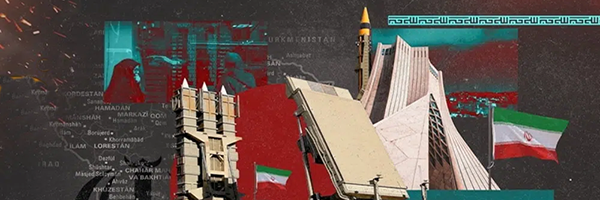Iran: The Age of Change Has Begun
 Orinoco Tribune, April 23, 2024 —
Orinoco Tribune, April 23, 2024 —
Despite sanctions, Iran has been transforming its economy and has succeeded in shifting the political equation against “Israel”, starting with Operation True Promise.
The latest developments between Tehran and Tel Aviv reflect a shift in Iran’s previous strategy in confronting “Israel”, encompassed in the change of what Iranian officials dubbed “strategic patience”.
The extensive range of rocket-based operations launched deep into occupied territories indicates that Iran seeks to establish deterrence against “Israel” and its Western allies’ military policies in the Middle East. With this consideration, Iran’s viewpoint becomes clear: The age of change has begun, and the future of the security organization in the region would not be stable without preserving Iran’s political and economic interests.
The changes that followed October 7 and “Israel’s” attempt to defeat Hamas, only expedited the establishment of Iran’s new strategic security approach.
The Yemeni Armed Forces, with their army and the Ansar Allah resistance fighters, joined the conflict directly against “Israel”, and threatened its interests in the Bab al-Mandab Strait, which simultaneously alerted the world.
And it seems like Tehran, through its strategic relations with Sanaa, is saying that it will not take lightly to movements against its interests in the region. Western countries are now well aware of that reality, and due to their growing concerns regarding the economic losses stemming from the hazards facing maritime trade security, they have increasingly pressured “Israel” over the recent weeks to dilute its military operations in Gaza.
Netanyahu’s disruptive government suffered the most intense damage, which could lead to his sacking mid-war. To overcome this crisis, Netanyahu tried to find a safe space for himself and attempted to control the opposition by directly targeting the Iranian consulate in Damascus and expanding tensions.
A shift in the political, strategic equation
The attack against the Iranian consulate in Damascus on April 1 led, on one hand, to the martyrdom of seven Iranian military officials, but on the other hand, senior Iranian officials, such as the leader of the Islamic Revolution Ayatollah Khamenei, considered it to be an attack against Iranian sovereignty and land. In other words, “Israel” overstepped Iran’s red lines and necessitated the decisive Iranian response to preserve the established strategic equation and place clear boundaries against “Israel’s” policy of aggression.
In the early days after the Israeli attack on the Iranian consulate, experts evaluated the Iranian response but showed contradicting views. Some speculated that it would be restrained, to avoid escalations or direct military confrontations against “Israel” and the United States. Meanwhile, some Western officials went as far as to contact Tehran to dissuade it from responding to “Israel”, citing warnings of the consequences. But the Iranian response would later signify a shock in reality, prompting different analyses of Iran.
The extensive missile and drone attacks launched against Israeli military bases from Iranian soil were out of the question for analysts and officials around the globe. Practically, the failure of the Israeli defenses, and the arrival of several Iranian missiles to their military targets, drew a clear scene of the Israeli defenses’ weakness. That comes regardless of the false Israeli claims about the failure of the Iranian attack or the intervention of several countries, particularly US, French, and British defenses, that have defended “Israel” during the attack.
The attack was in reality a monumental step in the formation of a new equation to balance the regional powers. Iran warning Washington against interfering in regional conflicts added another piece to this domino, which is now complete as the US backed away.
Besides the Iranian authorities’ trust in their own capabilities and military strength, it seems as though Iran prepared for the months leading up to this phase and anticipated the escalation of tensions as one of many scenarios. Following decades of harsh economic sanctions, “Israel” expected Iran’s calculations to be different regarding its response due to worries about increased economic troubles. The operation was speculated to have a lesser impact on “Israel”, but Iran’s extensive missile attack proved that it overcame these worries.
Iran transforms its economy despite sanctions
Iranian media published several reports revealing that the government noticeably increased its reserves in goods over the past few months, and ended a significant portion of its dependence on exports. But the stronger card placed on the table was the change in foreign asset reserves in the central bank, as sanctioned countries seek to nullify a large number of sanctions imposed on them by transforming their reserves to gold and precious metals without causing an economic crisis in the country.
Information shared by trusted foreign sources stated that the Iranian Central Bank increased its gold and precious metal reserves over the past three months, in an unprecedented move. This shows that Iran is working on finding a safe method to fund foreign trade despite the pressure of US sanctions, starting with the private and non-oil trade sectors, which allowed Iranian tradespeople to pay their forwards of foreign currency with gold.
In the same context, the stability and decrease in the value of the US dollar in the Iranian market after the Israeli attack and the Iranian response is also an indicator of the central bank’s success in curbing the effects of political actions on the market and Iran’s success in regaining the trust of its tradespeople.
The retaliatory operation on April 19 proved that Israeli officials faced a change in their previous ideas regarding Iran’s determination to respond militarily, which has shaken “Israel’s” standing on the chessboard with Iran.
